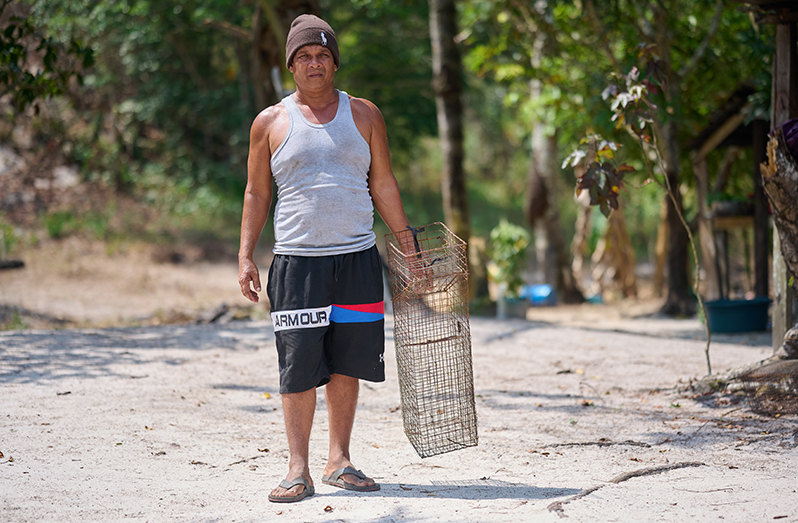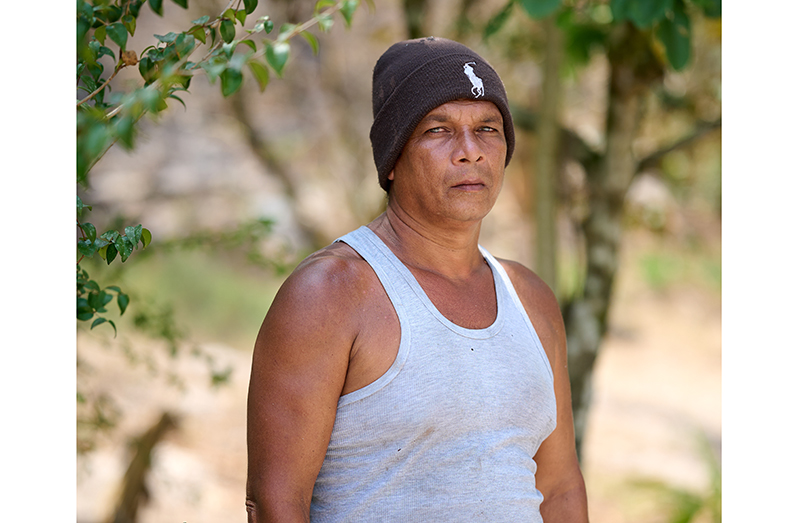And how villagers say climate change is making an impact
THE village of Dakara is home to charming people, red sand, creeks and a beautiful assortment of various wildlife species. Whereas jobs and career paths like farming and mining are expected and are popular, some have taken a different route in providing for their families.
Anthony Persaud works in the field of wildlife. He focuses on certain species of monkeys and birds, specifically parrots. Because trapping had to be done seasonally, it is not the most sustainable form of income. But there seems to be a different, bigger threat facing the wildlife in areas like Dakara. With the days longer and hotter coupled with the influx of mining in the village, climate change is being blamed for the dwindling presence of wildlife in Dakara.
Anthony Persaud lives at the entrance to Dakara village. His home rests in a valley between two hills surrounded by trees. Wildlife trapping is one of Anthony’s primary forms of income for his family. But his connection with nature is more than a job. Anthony describes it as a tradition, something passed down and learned from his father. “It was my father’s tradition. I learnt it from him. I started learning like around the age of 12 or 13 years old. When my father would go to catch birds, I would watch what he did and do the same thing. And that’s how I started my life from that,” Anthony shared.

The practices, baiting, trapping and caring for the wild animals were taught to Anthony from generations before him. But the older he got and the more involved he became in wildlife trapping, Anthony developed his own techniques. His father, for example, would catch birds using tree gum, placing the thick, sticky substance among the trees and having the birds fly into it get caught. But the issue with this, Anthony stated, was that birds would be caught one at a time.
So Anthony has worked to develop new tricks and practices. His most successful trap was that of capturing birds via nets. Anthony would scale the huge trees of Dakara to attach nets among them. Anthony explained the process and reasoning, stating, “When I chase the birds from the trees they fly and end up in the net. The net is between the bamboo, because a bird can’t fly straight up, they have to fly down first and that is how I catch them.”
“I catch mostly monkeys and parrots. And a few wild animals like anteaters. There are deer here, too.” Anthony stated. Whereas acquiring a flock of parrots is a walk in the park of Anthony, monkeys and anteaters prove to be a bit of a challenge. Bigger animals like the fascinating anteater have been proven to be dangerous. “Sometimes anteaters pass across and I would catch them. I hold them, I run behind them and hold on to their tail. But they are dangerous. They use their front claws.”
Anthony and other wildlife trappers alike are required to work within particular constraints. Trapping particular species of animals during certain times of the year is prohibited. Anthony has, however, noticed a shift in the climate and its effect on the animals. The larger animals are being spotted less frequently; the troops of monkeys have moved to new locations further away. And even the birds, it seems, don’t flock like they used to. Anthony has some theories as to why this is happening, but his prominent is climate change.

As a man who follows the animals for a livelihood, this has had an immense impact on his life and that of his family. Anthony disclosed that this has never happened before, but it is putting a strain on the father of one. He stated: “This has never happened before. I think it’s the climate and the weather; the heat. Sometimes we used to get a lot of birds. But now, we only getting a couple of birds to sell to have my family’s ends meet,” he said. “This season that is happening right now, the birds aren’t landing to be caught. At first, when it would rain in and out, the birds would land.”
In the face of changes and challenges, Anthony has turned to new avenues of providing for his family. He is still very involved with farming. He plants whatever he can grow on the land, mostly that of celery, provision and crops of the like. He is, however, looking forward to getting back into the field of trapping if the animals and situations permit. And Anthony believes that the possibility exists that he could. As a ‘nature man’ at heart, he firmly believes in preserving and treating nature with respect. The animals, he believes, exist as beautifully and as abundantly as they do because of the trees and plants in the country. And perhaps that is just the way Guyana was made.





.jpg)








